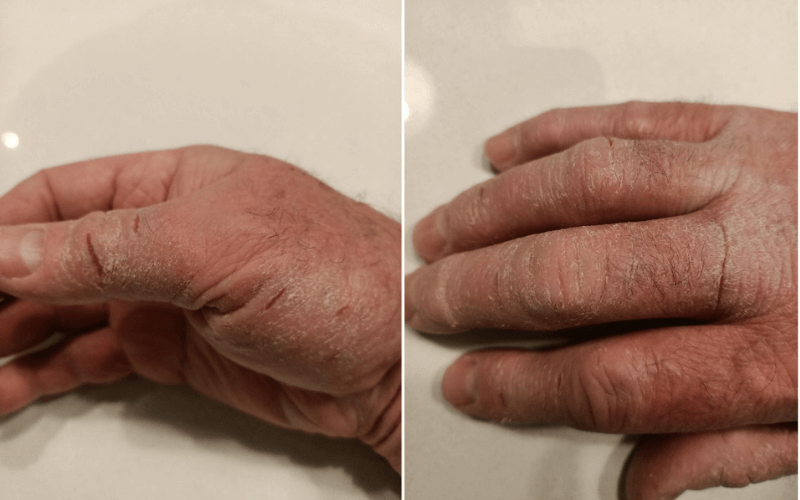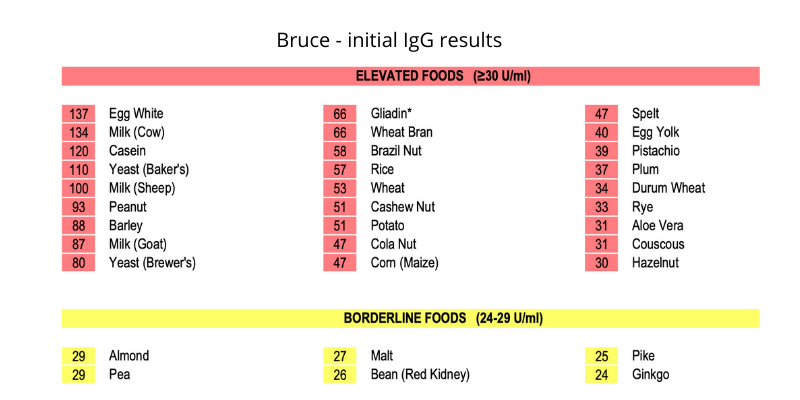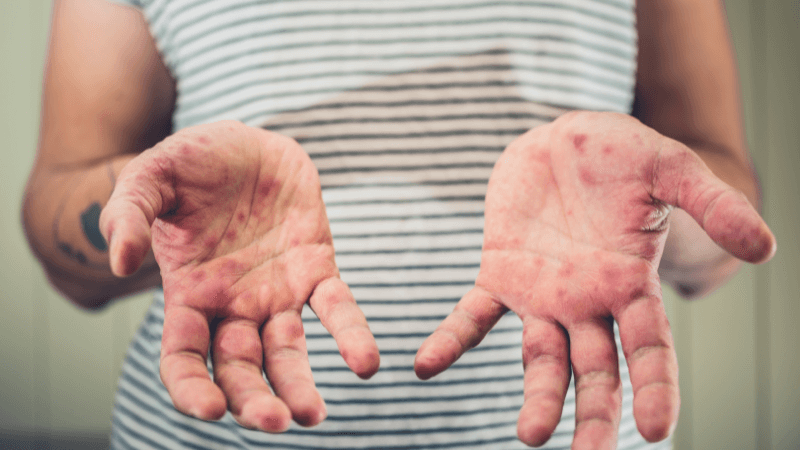Do you suffer from eczema? Is there an eczema diet that works?
Eczema (also known as atopic dermatitis) is a chronic condition that can be difficult to treat. It affects people of all ages and may manifest as rash anywhere on the body, but it’s commonly found anywhere between skin folds such as ones on the hands, knees, feet or joints. It tends to flare up periodically and may be associated with asthma, hay fever, skin infections and environmental triggers such as exposure to pollens or animal fur.
There many known eczema triggers, however, in some more complex cases it seems that the triggers are harder to identify and quite a bit of detective work is needed to find them. This is very important, as in my experience the key to deal with eczema successfully is to find the cause(s). Then support the body systems, organs or tissues that play a role in eczema development and the chronic symptoms for each individual.
Can a special diet can help with eczema?
Yes, it can! At least in my clinical experience so far. Elimination diets involve removing certain foods that can cause skin reactions or other food-related symptoms. Our clinical study on the benefits of food sensitivity testing and elimination diet based on the results, found that an elimination diet is effective and can either significantly reduce eczema or put it into remission.
IgG guided elimination diet is also helpful for identifying foods that may trigger other conditions such as bloating, leaky gut, gluten intolerance, autoimmunity and weight gain, among others.
What foods to consume if you have eczema?
This case study report will provide a few suggestions and answers tested and proved effective in my clinical practice. I’ll talk about the best and worst foods for eczema and how to stop or improve eczema symptoms permanently.
Eczema diet: which foods to eat and which to avoid
Case presentation
Bruce, a 62-year-old executive, recently retired after a rewarding but demanding corporate career which involved working long hours and frequent travel. He had enjoyed his post-retirement ‘slow life’ and felt content with his new lifestyle. Bruce also felt it was time for to ‘get healthy, change a few habits’ and improve his nutrition.
Bruce presented with the following initial health concerns:
- Eczema – often over many parts of the body, currently mainly on both hands. When it gets really bad, he took a steroid drug which cleared the eczema up in about a week. Although he disliked taking drugs, it was the only thing that relieved the inflammation when it got really bad. When we first talked, Bruce’s latest flair up was pretty bad – see the photos below
- Chronic muscle tightness and back spasms – for a long time
- High blood pressure – was taking a medication prescribed by his GP
- Excess weight – currently 93kg / Height 173cm. He wanted to lose around 15kg

Initial IgG food sensitivity test results
- High sensitivity ‘red’ foods: 27 across many food groups
- Borderline yellow foods: 6
Main foods/ food groups that needed to be excluded were:
- Dairy – all kinds: cow, goat, sheep and products made of them
- Gluten – all gluten containing grains and products made of them
- Eggs – both white and yolks
- Yeast – Brewer’s and baker yeast
- Nuts (7 kinds)

Order the IgG Food sensitivity test HERE.
Progress timeline
Bruce was keen to implement the elimination diet and made a very good start by removing all the ‘red’ and ‘yellow’ foods. As evident by his test results above, the nutrition changes that needed to be made were significant and across many food groups.
I consulted with Bruce on a regular basis during his 6 months on the elimination diet, and after the retest.
Consultation #2: 1 month on the elimination diet
Bruce had decided to do food sensitivity testing to get help with his long-term eczema (at times severe) that was present over many parts of the body, but mainly on both hands at the time. He also wanted to lose weight (around 15kg) and decrease muscles tightness and back spasms he experienced for a long time. In addition, he suffered from high blood pressure controlled by medication.
After a month on the elimination diet he reported eczema getting better. He adhered 100% to the diet when at home, but slipped when going out or socialising with friends.
Bruce cooked most nights since retiring and was experimenting with different recipes to replace the trigger foods as indicated in the test results. He was provided with a number of recipes tailored to his food requirements and was keen to try them. Increasing Bruce’s food variety was an important goal to reach as we progressed.
He reported feeling less tense and his muscles were more relaxed.
Weight loss since starting the elimination diet: 3 kg to 93kg (down from 96kg at the start).
Overall, he noted improvements in all symptoms we were monitoring.
Consultation #3: 2 months on the elimination diet
Bruce had an eczema flair up for the last few days, only on the hands. For a period of time when travelling he ate a few foods that were on his ‘red’ list, having no other options available. This resulted in the eczema symptoms worsening.
Otherwise, he closely adhered to the diet when at home. He was mindful of adding more variety to his meals, especially to his breakfasts. We discussed good breakfast options for him and he got more recipes to find new favourites.
At this time, we added a few supplements to support the body: a magnesium powder, B vitamins and a collagen powder to support connective tissue strength, thus helping with neck and back pain, and skin integrity.
He reported all his symptoms continued to improve.
Consultation #4: 3 months on the elimination diet
Bruce noted significant improvements at this point. There was no eczema anywhere on the body except small amounts on his hands. He said the eczema was exacerbated by using hand sanitisers required when entering shops or any business premises because of the COVID measures.
He broke the diet one weekend (he had cheesecake and gluten) and the eczema on his hands returned the next day. This episode confirmed for him a close connection between what he ate and the severity of his eczema symptoms.
Overall, his skin was very good when following the diet and avoiding/minimising hand sanitisers. His energy levels were higher and he slept better. Also, he was able to do more exercise.
Weight loss: 8kg since the start of the elimination diet (down to 88kg, initial weight 96kg).
Consultation #4: 4 months on the elimination diet
Bruce reported feeling good overall with only minimal eczema on the hands. His energy levels were good and he continued losing weight slowly.
When he closely adhered to the diet, all was well. He had a few episodes of eating gluten again when out but was strict with avoiding all dairy products.
Bruce remarked that not having rice and corn were the biggest diet obstacles for him, together with missing the Vegemite spread containing Brewer’s yeast.
He was taking apple cider vinegar before meals to stimulate stomach acid levels for better digestion, especially of proteins.
Consultation #5: 6 months on the elimination diet
We reviewed Bruce’s overall progress at the 6-month mark before doing the retest. He had a small flare up of eczema due to doing some gardening without wearing gloves. Also, he went away for a break and ate some gluten and dairy, and he expected a small setback with the eczema symptoms.
He said he takes pleasure in his food and ‘getting off track’ with the diet on occasions was an acceptable price to pay.
Following the elimination diet for 6 months helped to decrease an inflammatory response and he recovered from an eczema episode at a faster rate than before.
Weight loss since the last consultation: 3kg (from 88kg down to 85kg). Overall he lost 11kg since starting the elimination diet.
Consultation #6: Retest after 8 months on the elimination diet
Bruce reported doing well although he’d been less diligent with avoiding gluten and diary in the past 2 months.
The retest showed that both the ‘red’ and ‘yellow’ foods increased in numbers and reactivity.
Retest IgG food sensitivity results
- High sensitivity ‘red’ foods: 37 (up from 27 initially)
- Borderline yellow foods: 6 (up from 5 initially)
Notably, the Increase in the IgG antibody response and subsequently in numbers of food sensitivities did not translate to the increase of Bruce’s symptoms. His eczema remained in remission providing he followed the diet guidelines.

What are the possible reasons for the IgG antibody levels to increase at this point?
Throughout the study, we noticed that in around 50-60% of cases (usually in clients with chronic, long-term conditions) the retests showed a similar or sometimes even greater number of foods intolerances. This occurred despite the symptoms improving dramatically or even resolving completely.
Most likely reasons for the increase of trigger foods in this case were:
- Not adhering to the diet strictly enough – in Bruce’s case, it looked like his at times mixed adherence to the diet throughout the 6 months (especially considering gluten, dairy or rice) was likely a factor. Research into IgG testing suggests that this exposure can result in an enhanced secondary antibody response i.e. an increase in antibody levels. Therefore, if an individual is exposed to even small amounts of their trigger foods within the diet, then this can result in an excessive IgG antibody response.
- Retesting too early in the process – assessing IgG levels too early may produce results similar to Bruce’s due to insufficient time for the antibody levels to decrease naturally. It seemed likely that Bruce would need to avoid the trigger foods for a much longer period of time for the IgG levels to fall significantly.
- Leaky gut not improving sufficiently – continued issues with increased intestinal permeability (leaky gut) could be another explanation why certain individuals still have elevated IgG antibodies to trigger foods after 6 months of avoiding them.
- Key point: it is essential to understand that it is not the elevated IgG antibodies as such that cause inflammation triggered by food sensitivities, but the deposition of antibody-antigen immune complexes within tissues of the body – please read my post HERE for more detailed explanation. These immune complexes are created when IgG antibodies combine with the food protein antigen(s) for which they were created.
Summary and conclusions
Overall, Bruce achieved good improvements considering the long-term nature of his chronic health complaints, especially eczema. Compare Bruce’s before and after markers in the table below.

His high blood pressure readings also improved when he visited his doctor for a check-up towards the later stages of the elimination diet.
Overall, Bruce achieved around 80%-90% improvement in his overall symptoms intensity and frequency.
Read the fully referenced clinical study HERE.
Would you like help with eczema diet?
If you have been searching for an online gut naturopath or nutritionist helping clients based anywhere in Australia, please get in touch.
Book an online consultation now or click on the button below to book a free 25-minute initial discussion to talk about your circumstances and how I can help.
Find another case study on how to improve or overcome eczema HERE.
I look forward to helping you get better health and wellbeing soon!
Good health and blessings
Joanna Sochan
Wholistic Health and Lifestyle Therapist
Natural and Lifestyle Therapies for Abundant Health and Wellbeing
Additional resources
- Psoriasis, a wholistic approach to recovery
- Case studies page – check out all of our case studies here
- Parsley tea: a secret to glowing blemish free skin
- Gotu kola: uses and benefits for skin, stomach ulcers and memory
Disclaimer: The above material is for informational and educational purposes only. It should not be used to self-diagnose and it is not a substitute for a medical advice, diagnosis, treatment, prescription or recommendation. All viewers of this content, especially those taking prescription or over-the-counter medications, should not make any changes in their health regimen or diet before first consulting a doctor or other qualified health provider with any questions they may have regarding a medical condition or their particular circumstances.
 Joanna Sochan is a Natural Therapist and founder of Naturimedica Holistic Wellcare. She has a passion for helping clients transform their lives by becoming healthy and well naturally. Joanna has 12+ years experience in clinical practice and has special interest in solving complex cases, gut health, food sensitivities, hormone imbalances, autoimmune disorders and weight loss. She helps clients individually (mostly online) Australia-wide and also offers online therapeutic programs, eCourses and self-help eBooks. View full bio.
Joanna Sochan is a Natural Therapist and founder of Naturimedica Holistic Wellcare. She has a passion for helping clients transform their lives by becoming healthy and well naturally. Joanna has 12+ years experience in clinical practice and has special interest in solving complex cases, gut health, food sensitivities, hormone imbalances, autoimmune disorders and weight loss. She helps clients individually (mostly online) Australia-wide and also offers online therapeutic programs, eCourses and self-help eBooks. View full bio.
 Print This Post
Print This Post 


Leave A Comment